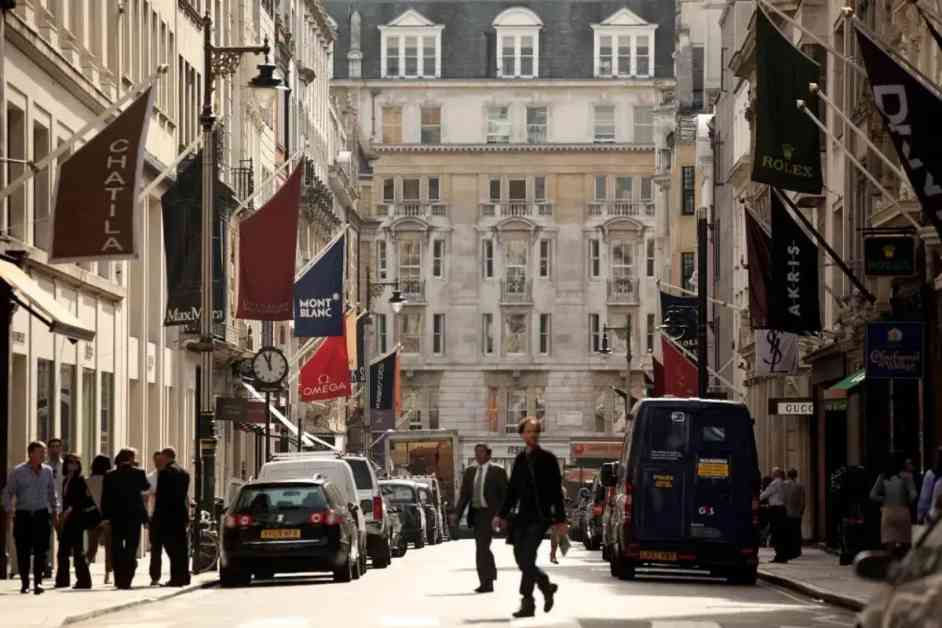London’s Prime Commercial Property Market: Key Pockets Driving Growth
London’s commercial prime property market continues to show resilience and growth, with key pockets driving investment and development in the city. While the overall market may be modest, certain areas such as Bond Street and the West End are attracting significant attention and investment from various sectors.
Bond Street Luxury Retail Investment
Despite global trends indicating a slowdown in luxury goods, Bond Street remains a thriving hub for retail investment. Transaction volumes for properties on this prestigious street reached £436 million in the second quarter of 2024, showing a remarkable 66 percent increase year-on-year. Investors are keen to secure a foothold in this exclusive market, recognizing the importance of brand presence and visibility in such a competitive landscape.
One of the notable transactions in Bond Street involved Sir James Dyson’s Weybourne family investment firm acquiring property from a private Hong Kong investor for £71 million. Additionally, Swiss luxury goods group Richemont, known for brands like Cartier and Chloé, purchased Boodles’ main store for £82 million at 178 New Bond Street. Other renowned brands such as Louis Vuitton, Chanel, Prada, and Sotheby’s have also made significant investments in properties along the street.
In comparison, Regent Street has experienced a substantial reduction in vacancy rates, dropping from 10.9 percent to 3.0 percent in the second quarter of 2024. This trend highlights the continued appeal and desirability of prime retail locations in London, with Bond Street leading the way in attracting investment and interest.
Hedge Funds in the West End
The West End has become synonymous with hedge funds, drawing in niche financial firms looking for prime office space in Mayfair. Between 2019 and 2023, the take-up of commercial prime office space by hedge funds increased by 46 percent, showcasing the sector’s commitment to London as a critical growth hub. Despite uncertainties surrounding Brexit and market challenges, London remains a preferred destination for financial firms seeking growth opportunities.
According to Knight Frank, over 70 percent of office deals made by hedge funds between 2019 and 2023 were for properties in the West End. In 2023 alone, hedge funds occupied 481,575 square feet of office space, marking a significant increase from previous years. Notable transactions include Millennium Management’s prelet of 50 Berkeley Street in December 2023, signaling a return to London for Izzy Englander’s multi-strategy hedge fund.
Other prominent deals in the region include Great Hill Partners opening an office at 60 Charlotte Street in Fitzrovia and One Rock Capital Partners establishing its European headquarters at 33 King Street in St James’s. The West End’s strategic location, proximity to central London, and networking opportunities make it an ideal choice for hedge funds looking to establish a presence in the city.
Sustainable Space City-Wide
The demand for sustainable office buildings has been a driving force behind office take-up in London, with over half of lettings in buildings boasting excellent or outstanding environmental ratings. Companies are increasingly viewing the workplace as a strategic tool for talent enrichment, leading to a preference for high-quality buildings in desirable locations.
According to Mike Hook, Executive Director at LMG, there has been a clear flight to quality, with grade A rents in attractive locations reaching record levels. Julian Woolgar, Partner at Knight Frank, emphasizes the intensifying competition for prime office space in the West End, particularly among niche financial firms seeking specific locations with limited supply.
Savills reports over 2 million square feet of commercial prime office space in the Square Mile currently under offer, surpassing the long-term average by 21 percent. As tenants seek smaller but higher-quality spaces with modern amenities and smart technologies, the market is expected to be driven by downsizing and a focus on quality over quantity.
In conclusion, London’s prime commercial property market continues to thrive, with key pockets such as Bond Street and the West End driving growth and investment in the city. As demand for sustainable office space rises and niche financial firms look to establish a presence in prime locations, London remains a vibrant hub for commercial real estate activity. With strategic investments and a focus on quality, London’s prime commercial property market is poised for continued success in the years to come.












